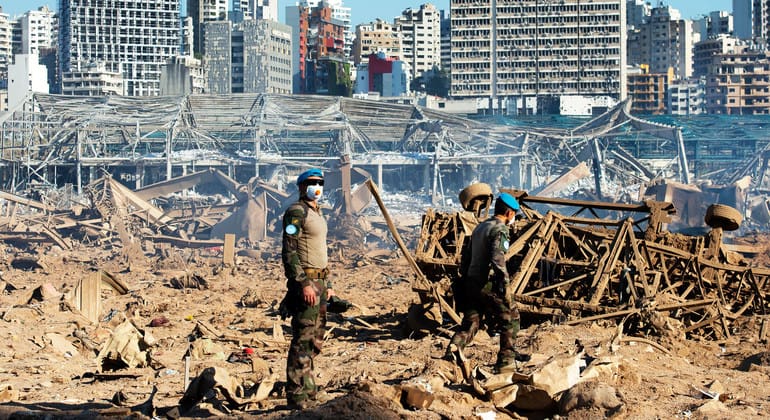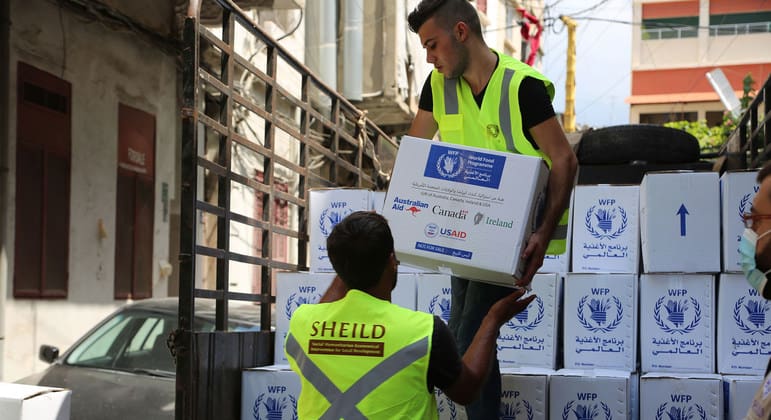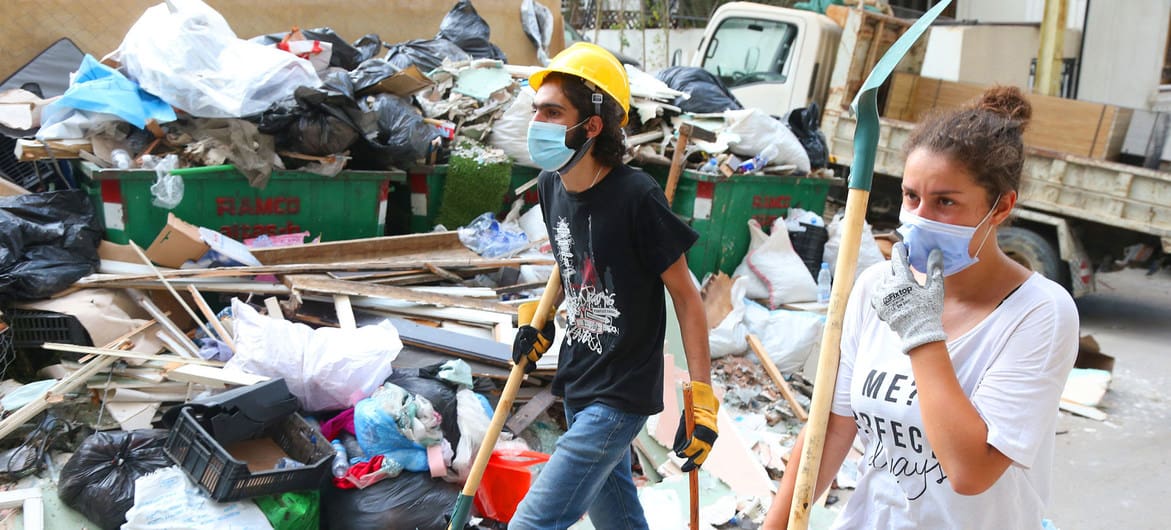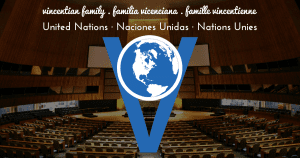The explosions on August 4 in Beirut profoundly impacted the Vincentian Family. We have experienced the worst effects. The Daughters of Charity mourn the loss of Sr. Sophie Khosrovian, who died from injuries sustained in the blast. Structures owned by the Daughters of Charity and Congregation of the Mission were badly damaged, as well as the Basilica of the Miraculous Medal, in addition to buildings housing services the Family provides, such as schools, hospitals, social service centers, and more.

Photo credit: United Nations News
Over 300,000 people from the city were left homeless. The BBC reports that over 200 were killed. Thousands were wounded. Issues such as homelessness, trauma, COVID-19, hunger, and rebuilding are concerns.
At the same time, we witness hope. Families help each other out in times of crisis, and it appears that is the reality in Beirut. No doubt, all branches are deeply engaged in helping the people of Beirut get back on their feet.
The Vincent De Paul Society is aiding people affected by the blast as is the Lebanon Branch of the International Association of Charity (AIC). The AIC, along with all the Family branches, invite prayers for the people of Beirut. Vincentian youth have rolled up their sleeves and are engaged in clean-up efforts. The Daughters of Charity and medical teams at Sacred Heart Hospital served injured persons in spite of damage to the facility. The Congregation of the Mission is engaged in clean up and presiding at Masses outside the damaged Basilica. We will likely never know all the ways each of our branches is heavily engaged in addressing the needs of local people impacted by the explosions, offering hope and trying to give Beirut a new start.
I have observed a number of Vincentian fund-raising efforts to assist Beirut. The Vincentian Family Homeless Alliance recently launched “From our Hearts to the Hearts of Lebanon,” which will raise finances for shelter, food, building materials, and healthcare. The AIC will soon feature a fundraiser on their Facebook page. All of our branches benefit from donations to help the cause.

Photo credit: United Nations News
You might ask, “What is the United Nations doing to help Beirut?”
The August 4 blasts gave rise to a complex system of needs, damage, and harm. A network of United Nations agencies and specialists are working diligently to help Beirut recover.
The UN immediately mobilized emergency help, such as temporary shelters, for persons displaced because of the explosions. Early on, the UN’s Office for the Coordination of Humanitarian Affairs (OCHA), released $6 million from the Central Emergency Response Fund to fund trauma care, support hospitals, repair damaged homes, and provide logistical help.
The UN sent in medical supplies, shelter kits, food parcels, and helped to reunite separated families. The United Nations also joined French President Emmanuel Macron in leading a donor’s conference on August 9.
“We will need all hands on deck” to address recovery, said UN Deputy Secretary Amina Muhammad at the time of the conference.
In addition to the donor’s conference, the UN on August 14 launched an appeal for $565 million to help the people of Beirut. According to OCHA, the funds will help pay for hot meals, food rations, and grain; repair of health facilities as well as needed trauma kits and medicines; shelter for families whose homes were damaged or stand in need of rehabilitation; repairs of common buildings and areas; repairs of schools and provision of educational supplies; and psychological support for children.
MEDICAL ASSISTANCE
At the time of the explosions, perhaps the greatest need was for medical supplies and care. Even before the tragedy occurred, Beirut, like the rest of the world, was addressing COVID-19. A number of World Health Organization (WHO) containers bearing supplies such as personal protective equipment, were destroyed in the blasts. WHO conducted an assessment of 55 health care centers in Beirut, noting that three hospitals were largely out of service and just over 50 percent of the health care centers are nonfunctional. It has issued a $76 million appeal for medical supplies and care. It is further working with medical teams from overseas to provide care. And it has delivered additional PPE, as well as surgical and trauma supplies, to 2000 patients at 10 hospitals.
Meanwhile, the United Nations Children’s Fund (UNICEF), provided vaccines and medical supplies, in addition to counseling for children traumatized by the blasts. It further provided drinking water for rescue workers.
FOOD AID
Because a large percentage of food stored in warehouses at the port was destroyed, the World Food Program is sending in 50,000 tons of wheat and grain. It provided immediate relief to people affected by the explosion through delivery of 150,000 food parcels. It also collaborated with Caritas Lebanon to provide hot meals in soup kitchens. With much infrastructure damaged, WFP is working to clean up an area of the port to allow for food delivery, and address other ways of streamlining supply chains and delivery.

Photo credit: United Nations News
ASSISTING MIGRANTS AND REFUGEES
According to the International Organization for Migration, about 8 percent of the 300,000 people affected in Beirut are migrant workers. The IOM appealed for over $10 million to help over 43,000 migrants and refugees impacted by the explosions. Meanwhile, the UN High Commission for Refugees (UNHCR) agency is investigating reports of 34 refugees being killed by the blasts.
EDUCATION
The August 4 blasts took a heavy toll on schools. Approximately 70 public and 50 private schools were totally destroyed or partially damaged, impacting about 55,000 students. The rehabilitation of schools is vital. The United Nations Educational, Scientific, and Cultural Organization (UNESCO) has committed to helping with rehabilitation. In addition, it will provide technical and financial support to enhance virtual learning opportunities.
HISTORICAL BUILDINGS
Beirut’s historic buildings stand in need of repair. UNSESCO is also leading an effort to help save and rehabilitate some of the city’s 60 historical buildings in danger of collapsing.
CALL FOR INDEPENDENT INVESTIGATION
The UN’s High Commissioner for Human Rights (UNHCHR), Michelle Bachelet, had warned before the explosions that Lebanon was fast spiraling out of control. She had urged reforms. The UNHCHR is now calling for an independent investigation into the explosion. “Victims’ calls for accountability must be heard, including through undertaking an impartial, independent, thorough and transparent investigation into the explosion,” said OHCHR Spokesperson Rupert Colville.
(With input from UN News)








My deepest condolences to the Daughters of Charity for the passing of Sr. Sophie. May her soul rest in eternal peace.
Thanks to the United Nations for their support for the people of Lebanon. Good to hear that the refugees and migrants are also being helped. God bless all the Vincentians assisting the the people of Lebanon.